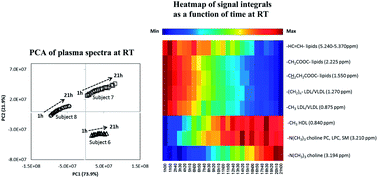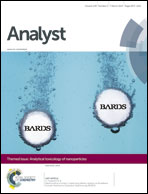Human plasma stability during handling and storage: impact on NMR metabolomics†
Abstract
This work contributes to fill in some existing gaps in the knowledge of human plasma degradability during handling and storage, a paramount issue in Nuclear Magnetic Resonance (NMR) metabolomics. Regarding the comparison between heparin and EDTA anti-coagulant collection tubes, the former showed no interference of the polysaccharide, while conserving full spectral information. In relation to time/temperature conditions, room temperature was seen to have a large impact on lipoproteins and choline compounds from 2.5 hours. In addition, short-term storage at −20 °C was found suitable up to 7 days but, for periods up to 1 month, −80 °C was recommended. Furthermore, in the case of reusing plasma samples, no more than 3 consecutive freeze–thaw cycles were found advisable. Finally, the impact of long-term −80 °C storage (up to 2.5 years) was found almost negligible, as evaluated on a partially matched non-fasting cohort (n = 49), after having investigated the possible confounding nature of the particular non-fasting conditions employed.


 Please wait while we load your content...
Please wait while we load your content...